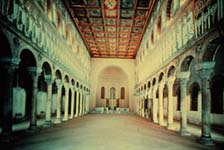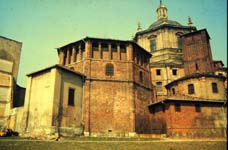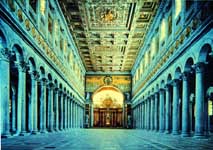THE EARLY CHURCH: FROM CRISIS TO TRIUMPH
Michael S. Russo
Molloy College
I. Origins of Christianity
During the reign of Caesar Augustus, a new religion appeared in the Roman Empire that would have an enormous impact on the subsequent history of Western civilization. This new religion, Christianity, spread so rapidly that within four centuries it would become the dominant religion throughout much of the Empire.
And yet the origins of the Christian faith are amazingly humble. The religion began in a backwards Roman province known as Judea, and its founder was a carpenter from Nazareth named Jesus. At the age of thirty, this obscure fellow began preaching throughout Judea and within a matter of three years, he was arrested on charges of trying to make himself King of the Jews. He was crucified around 30 A.D. by the Roman governor of the province, Pontius Pilate, at the urging of influential Jews.
During the reign of Caesar Augustus, a new religion appeared in the Roman Empire that would have an enormous impact on the subsequent history of Western civilization. This new religion, Christianity, spread so rapidly that within four centuries it would become the dominant religion throughout much of the Empire.
And yet the origins of the Christian faith are amazingly humble. The religion began in a backwards Roman province known as Judea, and its founder was a carpenter from Nazareth named Jesus. At the age of thirty, this obscure fellow began preaching throughout Judea and within a matter of three years, he was arrested on charges of trying to make himself King of the Jews. He was crucified around 30 A.D. by the Roman governor of the province, Pontius Pilate, at the urging of influential Jews.
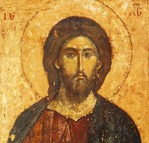
The teachings of Jesus of Nazareth, while representing a natural evolution within Jewish thought, were actually quite radical. Jesus preached a doctrine of selfless love that is best captured in what has come to be known as the golden rule: "do unto others as you would have them do unto you." He also claimed to be the Messiah---the savior promised to the Jewish people by the prophets---and it was this claim that got him into such hot water with Jewish and Roman authorities.
Although Jesus managed to attract huge crowds wherever he went to preach, his crucifixion in 30 AD seemingly marked the failure of his attempts to reform Judaism. His death so terrified his followers that the even his most intimate disciples fled rather than face persecution themselves. According to tradition, however, something rather remarkable happened on the Sunday following the crucifixion of Jesus. It is reported that he rose from the dead and appeared to his disciples. The resurrection was taken by the disciples of Jesus as a sign that he was indeed the promised Messiah and inflamed them with new faith and courage.
II. The Spread of The Christian Faith
Not long after Jesus reportedly rose from the dead, his disciples began to preach his message throughout Judea with mixed results. Then a Jewish rabbi from Tarsus named Paul (or Saul) suddenly had a conversion on the road to Damascus while on his way to persecute the Christian community there. After this he became the most active and dynamic missionary for the new faith. Beginning with the Jews themselves, he gradually began preaching to gentiles (non-Jews) throughout the empire. His travels took him to such important cities as Galatia, Athens, Corinth and Ephesus. In 60 AD he was arrested by Jewish authorities on the charge of blasphemy and treason. Turned over to the Roman authorities, he was taken to Rome, where for two years he awaited trial. During this time he managed to preach the Christian message to large numbers of Romans (he may even have encountered the Stoic philosopher Seneca at this time). He was put to death during the reign of Nero in 62 A.D.
In some ways Paul is even more important to the spread of Christianity than Jesus himself was. Remember: there were no texts written yet about the life and teachings of Jesus. Paul's numerous epistles, therefore, became a primary source of information about Christianity to men and women throughout the Empire. Unlike the rest of the Apostles, who were simple illiterate men, Paul was also highly educated, had a great command of the Greek language and a highly cultivated writing style---all of which helped him greatly in his missionary activities. His primary importance in the history of Christianity is that he took what was essentially a small fringe element within Judaism and turned it into an international religion with Churches established throughout the Roman Empire.
What was it that enabled this religion to spread so rapidly throughout Europe? For one thing, the unity and stability brought about by the Pax Romana enabled Christians, like Paul, Barnabas and Peter to travel huge distances in relative safety, spreading the message of Christianity to a much wider audience than would otherwise have been possible. In addition the existence of widespread social inequality made poor freedmen and slaves particularly receptive to a religion that preached the equality of all human beings in Christ. Finally, Christianity began to spread at the same time that many throughout the Empire were becoming disenchanted with the banality of the old religions of the Empire. The passion and zeal of the early Christians greatly impressed those who were looking for a more dynamic faith to practice.
Although Jesus managed to attract huge crowds wherever he went to preach, his crucifixion in 30 AD seemingly marked the failure of his attempts to reform Judaism. His death so terrified his followers that the even his most intimate disciples fled rather than face persecution themselves. According to tradition, however, something rather remarkable happened on the Sunday following the crucifixion of Jesus. It is reported that he rose from the dead and appeared to his disciples. The resurrection was taken by the disciples of Jesus as a sign that he was indeed the promised Messiah and inflamed them with new faith and courage.
II. The Spread of The Christian Faith
Not long after Jesus reportedly rose from the dead, his disciples began to preach his message throughout Judea with mixed results. Then a Jewish rabbi from Tarsus named Paul (or Saul) suddenly had a conversion on the road to Damascus while on his way to persecute the Christian community there. After this he became the most active and dynamic missionary for the new faith. Beginning with the Jews themselves, he gradually began preaching to gentiles (non-Jews) throughout the empire. His travels took him to such important cities as Galatia, Athens, Corinth and Ephesus. In 60 AD he was arrested by Jewish authorities on the charge of blasphemy and treason. Turned over to the Roman authorities, he was taken to Rome, where for two years he awaited trial. During this time he managed to preach the Christian message to large numbers of Romans (he may even have encountered the Stoic philosopher Seneca at this time). He was put to death during the reign of Nero in 62 A.D.
In some ways Paul is even more important to the spread of Christianity than Jesus himself was. Remember: there were no texts written yet about the life and teachings of Jesus. Paul's numerous epistles, therefore, became a primary source of information about Christianity to men and women throughout the Empire. Unlike the rest of the Apostles, who were simple illiterate men, Paul was also highly educated, had a great command of the Greek language and a highly cultivated writing style---all of which helped him greatly in his missionary activities. His primary importance in the history of Christianity is that he took what was essentially a small fringe element within Judaism and turned it into an international religion with Churches established throughout the Roman Empire.
What was it that enabled this religion to spread so rapidly throughout Europe? For one thing, the unity and stability brought about by the Pax Romana enabled Christians, like Paul, Barnabas and Peter to travel huge distances in relative safety, spreading the message of Christianity to a much wider audience than would otherwise have been possible. In addition the existence of widespread social inequality made poor freedmen and slaves particularly receptive to a religion that preached the equality of all human beings in Christ. Finally, Christianity began to spread at the same time that many throughout the Empire were becoming disenchanted with the banality of the old religions of the Empire. The passion and zeal of the early Christians greatly impressed those who were looking for a more dynamic faith to practice.
III. The Christian Persecutions
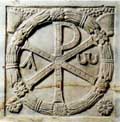
From the very beginning of the history of the Church, the disciples of Jesus were subject to persistent persecution--first from the Jews, then from the pagans, and finally, in an even more systematic and ruthless way, by the government of the Empire itself. The reasons for this hostility towards Christianity are threefold: (1) Christianity, like Judaism, is a religion that is essentially intolerant of other religious faiths and practices. The early Christian missionaries were not content that people worshipped Christ alongside other pagan deities; they demanded the exclusive worship of Christ alone. The vehement attacks of the early Christians against all pagan deities and rites served only to increase the hostility of these pagans towards the Christians. (2) From the perspective of Roman authorities, the refusal of the early Christians to worship the divinity of the emperor could only seem like a blatant act of treason, since emperor-worship was viewed as an essential way to maintain unity throughout such a vast and heterogeneous empire. Those who refused to worship the Emperor were thus viewed as enemies of the state and had to be persecuted. The refusal of Christians to serve in the Roman army only increased the suspicion of Roman authorities that Christian were disloyal to the Empire. (3) The early Christians were often accused unjustly by their pagan counterparts of many absurd crimes based upon misunderstandings that these pagans had about Christian beliefs and practices. Among the accusations raised against Christians were that they were atheists (because they did not take part in traditional forms of worship), that they practiced incest (a misunderstanding about the love that Christian "brothers" and "sisters" were supposed to have for one another) and that they were cannibals (because they consumed the body and blood of Christ).
During the first three centuries of its existence, the early Church was subject to intense but sporadic persecution. Peter, Paul and almost all of the other apostles were executed as enemies of the State, as were large numbers of later converts. The manner in which these men and women were killed was often particularly harsh: crucifixion, beheading, being burnt to death and being torn apart by wild animals in the amphitheater were common methods of execution. Fortunately many of the acts of the early martyrs of the Church have been passed down to posterity, so we have documented evidence of the extraordinary faith of these brave men and women. One of the most interesting of these accounts is the story of the persecution of Christians that took place in Lyons in 177 AD. Among those arrested were Ponthinus, the bishop of the city, the deacon Sanctus and the slave Blandina. The account of their heroic deaths has been preserved for us by Eusebius of Caesarea in his Church History:
|
To every question Sanctus replied in Latin: "I am a Christian." This he confessed again and again, instead of name and race and city and all else, and no other word did the heathen hear from his lips...When nothing else was left to inflict upon him they applied red-hot brazen plates to the most tender parts of his body. And though these were burning, Sanctus himself remained unbending and unyielding, and firm in his confession: for he was bedewed and strengthened by the heavenly fountain of the water of life which issues from the side of Christ. His poor body was a witness to what he had undergone---one whole wound and bruise, contracted, having lost the outward form of a man....
Now the blessed Ponthinus, to whom had been appointed the ministry of the episcopate at Lyons, was above ninety years of age, and very frail in body. He breathed with difficulty because of the bodily weakness which was laid upon him, but the earnest desire of martyrdom filled him with that renewed strength which a willing spirit supplies. He too was taken off to the tribunal, and though his whole body was weakened by both age and disease, his life was preserved within him, that through it Christ might triumph. He was conveyed to the tribunal by the soldiers, escorted by the city authorities and the whole multitude, who gave utterance to all sorts of cries, as if he were Christ himself; and so he gave good witness. Being examined by the governor as to who the God of the Christians was, he replied, "if you are worthy, you will know." Blandina, suspended on a stake, was exposed as food to the wild beasts which were let loose against her. Even to look on her, as she hung cross-wise in earnest prayer, fortified those who were also [facing death], for in their conflict they beheld with their outward eyes, through their sister, him who was crucified for them.... The blessed Blandina, last of all, having, like a highborn mother, exhorted her children and sent them forth victorious to the King, traveled herself along the same path of conflicts as they did, and hastened to them, rejoicing and exulting at her departure, like one bidden to a marriage supper, rather than cast to the wild beasts. And after the scourging, after the wild beasts, after [being roasted], she was at last thrown in a basket and presented to a bull. For a time the animal tossed her, but she had now lost all perception of what was happening, thanks to the hope she cherished, the grasp of the objects of her faith, and her converse with Christ. Then she too was sacrificed and even the heathen themselves acknowledged that never in their experience had a woman endured so many and terrible sufferings. |
One would think that such violent persecution would have dissuaded others from becoming Christians. In fact, the opposite result happened: the early Christians went to the death with such courage and poise that pagans in large numbers began to take up the faith. It is estimated that by the end of the second century Christians made up approximately 5% of the population of the empire and that by the end of the third century they were beginning to pose a serious challenge to the Roman state religion.
In an attempt to respond to this challenge the Emperor Diocletian undertook the last and greatest persecution of the Christians, destroying Churches and putting to dead thousands of Christians who refused to offer sacrifice to pagan divinities. His attempts to eradicate Christianity from the Empire, however, failed and his successors wisely began trying to accommodate themselves towards the ever-growing religion.
IV. The Triumph of the Church
After the death of Diocletian, the imperial system of government began to break down. Between 306 and 311 there were as many as seven emperors, each waging war on one another. In an attempt to gain control for himself, Constantine, one of these contenders for the throne, began to eliminate his rivals one by one. In 312 AD he achieved a decisive victory over Maxentius at the Milvian Bridge that left him the sole ruler of the Empire. The Christian historian, Eusebius, describes how this victory came as a result of a divine intervention that Constantine received just before the battle:
In an attempt to respond to this challenge the Emperor Diocletian undertook the last and greatest persecution of the Christians, destroying Churches and putting to dead thousands of Christians who refused to offer sacrifice to pagan divinities. His attempts to eradicate Christianity from the Empire, however, failed and his successors wisely began trying to accommodate themselves towards the ever-growing religion.
IV. The Triumph of the Church
After the death of Diocletian, the imperial system of government began to break down. Between 306 and 311 there were as many as seven emperors, each waging war on one another. In an attempt to gain control for himself, Constantine, one of these contenders for the throne, began to eliminate his rivals one by one. In 312 AD he achieved a decisive victory over Maxentius at the Milvian Bridge that left him the sole ruler of the Empire. The Christian historian, Eusebius, describes how this victory came as a result of a divine intervention that Constantine received just before the battle:
|
Being convinced, however, that he needed some more powerful aid than his military forces could afford him, on account of the wicked and magical enchantments which were so diligently practiced by the tyrant, he sought Divine assistance, deeming the possession of arms and a numerous soldiery of secondary importance, but believing the co-operating power of Deity invincible and not to be shaken. He considered, therefore, on what God he might rely for protection and assistance. While engaged in this enquiry, the thought occurred to him, that, of the many emperors who had preceded him, those who had rested their hopes in a multitude of gods, and served them with sacrifices and offerings, had in the first place been deceived by flattering predictions, and oracles which promised them all prosperity, and at last had met with an unhappy end, while not one of their gods had stood by to warn them of the impending wrath of heaven; while one alone who had pursued an entirely opposite course, who had condemned their error, and honored the one Supreme God during his whole life, had formally proclaimed him to be the Savior and Protector of his empire, and the Giver of every good thing...Reviewing...all these considerations, he judged it to be folly indeed to join in the idle worship of those who were no gods, and, after such convincing evidence, to err from the truth; and therefore felt it incumbent on him to honor his father's God alone.
Accordingly he called on him with earnest prayer and supplications that he would reveal to him who he was, and stretch forth his right hand to help him in his present difficulties. And while he was thus praying with fervent entreaty, a most marvelous sign appeared to him from heaven....He said that about noon, when the day was already beginning to decline, he saw with his own eyes the trophy of a cross of light in the heavens, above the sun, and bearing the inscription, CONQUER BY THIS. At this sight he himself was struck with amazement, and his whole army also, which followed him on this expedition, and witnessed the miracle. He said, moreover, that he doubted within himself what the import of this apparition could be. And while he continued to ponder and reason on its meaning, night suddenly came on; then in his sleep the Christ of God appeared to him with the same sign which he had seen in the heavens, and commanded him to make a likeness of that sign which he had seen in the heavens, and to use it as a safeguard in all engagements with his enemies. ...[B]eing struck with amazement at the extraordinary vision, and resolving to worship no other God save Him who had appeared to him, he sent for those who were acquainted with the mysteries of His doctrines, and enquired who that God was, and what was intended by the sign of the vision he had seen. They affirmed that He was God, the only begotten Son of the one and only God: that the sign which had appeared was the symbol of immortality, and the trophy of that victory over death which He had gained in time past when sojourning on earth. They taught him also the causes of His advent, and explained to him the true account of His incarnation. Thus he was instructed in these matters, and was impressed with wonder at the divine manifestation which had been presented to his sight. Comparing, therefore, the heavenly vision with the interpretation given, he found his judgment confirmed; and, in the persuasion that the knowledge of these things had been imparted to him by Divine teaching, he determined thenceforth to devote himself to the reading of the Inspired writings. Moreover, he made the priests of God his counselors, and deemed it incumbent on him to honor the God who had appeared to him with all devotion. And after this, being fortified by well-grounded hopes in Him, he hastened to quench the threatening fire of tyranny. |
According to this account, Constantine had a vision of a glowing cross in the sky bearing the words "In this sign you will conquer." He had this sign (the letters P and X joined together, which was used in the early Church to represent Christ) placed on his imperial banner prior to going into battle. His subsequent victory was said to have made him favorably disposed towards the Christian faith. In 313 Constantine issued the Edict of Milan with his co-emperor in the East, Licinius. This edict allowed for complete religious toleration throughout the Empire.
Although Constantine did not receive baptism until just before his death in 337, he became an important patron of the Church. In 325, for example, he called the first Council of Catholic Bishops at Nicaea. This Council of Nicaea helped to unified many doctrines of the faith and issued an official statement of the Christian faith, which has come to be known as the Nicaean Creed.
Although Constantine did not receive baptism until just before his death in 337, he became an important patron of the Church. In 325, for example, he called the first Council of Catholic Bishops at Nicaea. This Council of Nicaea helped to unified many doctrines of the faith and issued an official statement of the Christian faith, which has come to be known as the Nicaean Creed.
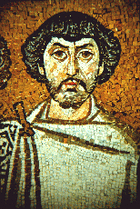
By the reign of Theodosius (379-395), Christianity had become the official state religion of the Roman Empire. The "Edict of Theodosius," promulgated in 380 AD effectively delegitimized all forms of worship in the empire other than Catholic Christianity. The text of this decree reads as follows:
"It is Our will that all the people who are ruled by the administration of our Clemency shall practice that religion which the divine Peter the Apostle transmitted to the Romans, as the religion which he introduced makes clear even unto this day. It is evident that this is the religion that is followed by the Pontiff Damasus and by Peter, Bishop of Alexandria....We command that those persons who follow this rule shall embrace the name of Catholic Christians. The rest, however, who we adjudge demented and insane, shall sustain the infamy of heretical dogmas, their meeting places shall not receive the name of churches, and they shall be smitten first by divine vengeance and secondly by the retribution of Our own initiative, which we shall assume in accordance with divine Judgment."
Theodosius also exempted the Church from taxation and gave bishops secular authority equal almost to that of provincial governors; he also made Roman citizenship incumbent upon membership within the Church. Although paganism continued to survive for some time in the West, it was Christianity now that was the dominant religion and the central unifying element of the Empire.
By the end of the fourth century, the Church, benefiting from its exclusive status within the empire, began to become much more politically powerful and wealthy. Constantine and his successors gave the Church imperial buildings (basilicas) to put to religious use. This period began an extensive building program with impressive Churches springing up throughout the empire.
"It is Our will that all the people who are ruled by the administration of our Clemency shall practice that religion which the divine Peter the Apostle transmitted to the Romans, as the religion which he introduced makes clear even unto this day. It is evident that this is the religion that is followed by the Pontiff Damasus and by Peter, Bishop of Alexandria....We command that those persons who follow this rule shall embrace the name of Catholic Christians. The rest, however, who we adjudge demented and insane, shall sustain the infamy of heretical dogmas, their meeting places shall not receive the name of churches, and they shall be smitten first by divine vengeance and secondly by the retribution of Our own initiative, which we shall assume in accordance with divine Judgment."
Theodosius also exempted the Church from taxation and gave bishops secular authority equal almost to that of provincial governors; he also made Roman citizenship incumbent upon membership within the Church. Although paganism continued to survive for some time in the West, it was Christianity now that was the dominant religion and the central unifying element of the Empire.
By the end of the fourth century, the Church, benefiting from its exclusive status within the empire, began to become much more politically powerful and wealthy. Constantine and his successors gave the Church imperial buildings (basilicas) to put to religious use. This period began an extensive building program with impressive Churches springing up throughout the empire.
V. The Spread of Heresy
Unfortunately, nothing good lasts forever. And this is true of the unity of Christians in the early Church. Almost from the beginning of the history of Christianity, heretical sects began to spring up within Christianity itself that threatened to tear the Church apart. One of these sects, the Arians, denied the divinity of Christ---a position which was to be condemned at the Council of Nicaea. Another sect , the Manichaeans, preached a radical form of dualism, arguing that the material world and the body were both evil. Finally, the Pelagians held an exalted view of man's ability to overcome sin through the power of his own will and denied the necessity of grace for salvation. Each of these views had to be combated by the Church in order to prevent its teachings from becoming undermined by erroneous doctrines.
By the middle of the fourth century, the Church began to accept the assistance of the State in repressing these heretical movements. Although it might seem strange that a religion that itself was subject to violent persecution by the State should use the resources of the State to coerce others to conform to its teachings, the suppression of heretics was viewed by many ecclesiastical authorities as a kind of self defense against their attacks on the true faith. Even the great Catholic theologian and bishop, St. Augustine, eventually came to agree that some degree of coercion was necessary to persuade heretics for the sake of their own souls to embrace the Catholic faith:
|
You must not consider just the mere fact of coercion, but the nature of that to which one is coerced, whether it be good or bad; not that anyone can become good in spite of his own will, but that through fear of suffering what he does not desire, he either renounces his hostile prejudices or is compelled to examine the truth of which he has been contentedly ignorant, and under the influence of this fear repudiates the error he was wont to defend, or seeks the truth of which he formerly knew nothing, and now willingly holds what he formerly rejected...
I have therefore yielded to the evidence afforded by these instances which my colleagues have laid before me. For originally my opinion was that no one should be coerced into the unity of Christ, that we must act only by words, fighting only by arguments, and prevail by force of reason, lest we should have those whom we knew as avowed heretics feigning themselves to be Catholics. But this opinion of mine was overcome not by the words of those who controverted it, but by the conclusive instance to which they could point. |
Augustine, in fact, would go on to the become one of the most successful opponents of heresy in the Church---though his success came more from his skills as a theologian and philosopher than from his use of force against heretics. As Bishop of Hippo, he successfully combated such heretical groups as the Donatists, Manichaeans, and Pelagians in North Africa. His polemical works against the fallacious doctrines of these groups also served to clarify the Catholic positions on many theological and ecclesiastical issues throughout the Middle Ages. Even as late as the fourteenth century, the Dominican friar, Thomas Aquinas, would look back to these works of Augustine's when attempting to elucidate his own theological position.
VI. The Fall of the Empire in the West
After the death of the Emperor Theodosius, the Empire was officially divided into two parts: the Western half of the Empire continued to have its capital at Rome, while the Eastern half was ruled from Constantinople.
The northern frontiers of the Roman Empire in the West were inhabited by various "barbarian" tribes---the Franks, Vandals, Visigoths, and Ostrogoths, among others. Towards the end of the of the fourth century, these tribes simultaneously began to invade the Empire. The reason for this sudden migration was that these tribes themselves were being displaced by invading huns from Central Asia. Because all these tribes began invading at the same time along a huge two-thousand mile frontier, it was virtually impossible for them to be resisted by Imperial forces.
Around 402 AD the Visogoths, under the leadership of Alaric, invaded Italy and in 410 sacked the city of Rome itself. Meanwhile other Germanic tribes began to cross the Rhine in large numbers invading Gaul, Italy and Spain, while the Vandals went on to conquer much of North Africa. Finally in 476, the Emperor Romulus Augustulus was dethroned by Odoacer, spelling the end of the Roman Empire in the West. The Empire in the East, on the other hand, with its capital at Constantinople, would continue to survive for several more centuries.
VII. Things to Come
The Fall of the Roman empire in the West by no means spelled the end of Christian dominance in Europe. Many barbarian leaders had great respect for Roman culture and for the Christian faith. A good number had already been converted to Christianity, even if most tended to be Arians rather than Catholics.
Although the three centuries following the Fall of Rome in 476 would come to be referred to as the "dark ages" in Europe, the Church managed to continue functioning and helped to preserve Greek and Roman culture and thought. Amidst the chaos following the disintegration of the Empire in the West, monastic communities began to spring up throughout Europe, offering those who entered places of refuge in a dangerous world.
Eventually a new Empire would be created out of the ruins of the old, when on Christmas Day 800, Charlemagne, King of the Franks, was crowned emperor by Pope Leo III. By 800 the Franks had already defeated most of the other barbarian tribes in Western Europe and, best of all from the perspective of their Church, they had been Catholics since their King Clovis converted in 496. From Leo's perspective, then, there could be no better protector for the Church than Charlemagne and the Franks.
The coronation of Charlemagne by the Pope signified the rise of a new Holy Roman Empire in the West, one in which the Church would play a central role in the organization of European society. The only question that would remain was who the final authority of the Empire would be---the Pope or the Emperor?
VI. The Fall of the Empire in the West
After the death of the Emperor Theodosius, the Empire was officially divided into two parts: the Western half of the Empire continued to have its capital at Rome, while the Eastern half was ruled from Constantinople.
The northern frontiers of the Roman Empire in the West were inhabited by various "barbarian" tribes---the Franks, Vandals, Visigoths, and Ostrogoths, among others. Towards the end of the of the fourth century, these tribes simultaneously began to invade the Empire. The reason for this sudden migration was that these tribes themselves were being displaced by invading huns from Central Asia. Because all these tribes began invading at the same time along a huge two-thousand mile frontier, it was virtually impossible for them to be resisted by Imperial forces.
Around 402 AD the Visogoths, under the leadership of Alaric, invaded Italy and in 410 sacked the city of Rome itself. Meanwhile other Germanic tribes began to cross the Rhine in large numbers invading Gaul, Italy and Spain, while the Vandals went on to conquer much of North Africa. Finally in 476, the Emperor Romulus Augustulus was dethroned by Odoacer, spelling the end of the Roman Empire in the West. The Empire in the East, on the other hand, with its capital at Constantinople, would continue to survive for several more centuries.
VII. Things to Come
The Fall of the Roman empire in the West by no means spelled the end of Christian dominance in Europe. Many barbarian leaders had great respect for Roman culture and for the Christian faith. A good number had already been converted to Christianity, even if most tended to be Arians rather than Catholics.
Although the three centuries following the Fall of Rome in 476 would come to be referred to as the "dark ages" in Europe, the Church managed to continue functioning and helped to preserve Greek and Roman culture and thought. Amidst the chaos following the disintegration of the Empire in the West, monastic communities began to spring up throughout Europe, offering those who entered places of refuge in a dangerous world.
Eventually a new Empire would be created out of the ruins of the old, when on Christmas Day 800, Charlemagne, King of the Franks, was crowned emperor by Pope Leo III. By 800 the Franks had already defeated most of the other barbarian tribes in Western Europe and, best of all from the perspective of their Church, they had been Catholics since their King Clovis converted in 496. From Leo's perspective, then, there could be no better protector for the Church than Charlemagne and the Franks.
The coronation of Charlemagne by the Pope signified the rise of a new Holy Roman Empire in the West, one in which the Church would play a central role in the organization of European society. The only question that would remain was who the final authority of the Empire would be---the Pope or the Emperor?
VIII. Suggestions for Further Reading
- Bokenkotter, Thomas. A Concise History of the Catholic Church. Garden City: Doubleday, 1966.
- Chadwick, Henry. The Early Church. New York: Penguin, 1964.
- Frend, W.H.C. The Rise of Christianity. Fortress Press, 1984.
- Johnson, Paul. A History of Christianity. New York: Penguin, 1984.
- Russo, Michael. "The African Church in an Age of Persecution."
© Michael S. Russo, 2001. This text is copyright. Permission is granted to print out copies for educational purposes and for personal use only. No permission is granted for commercial use.


